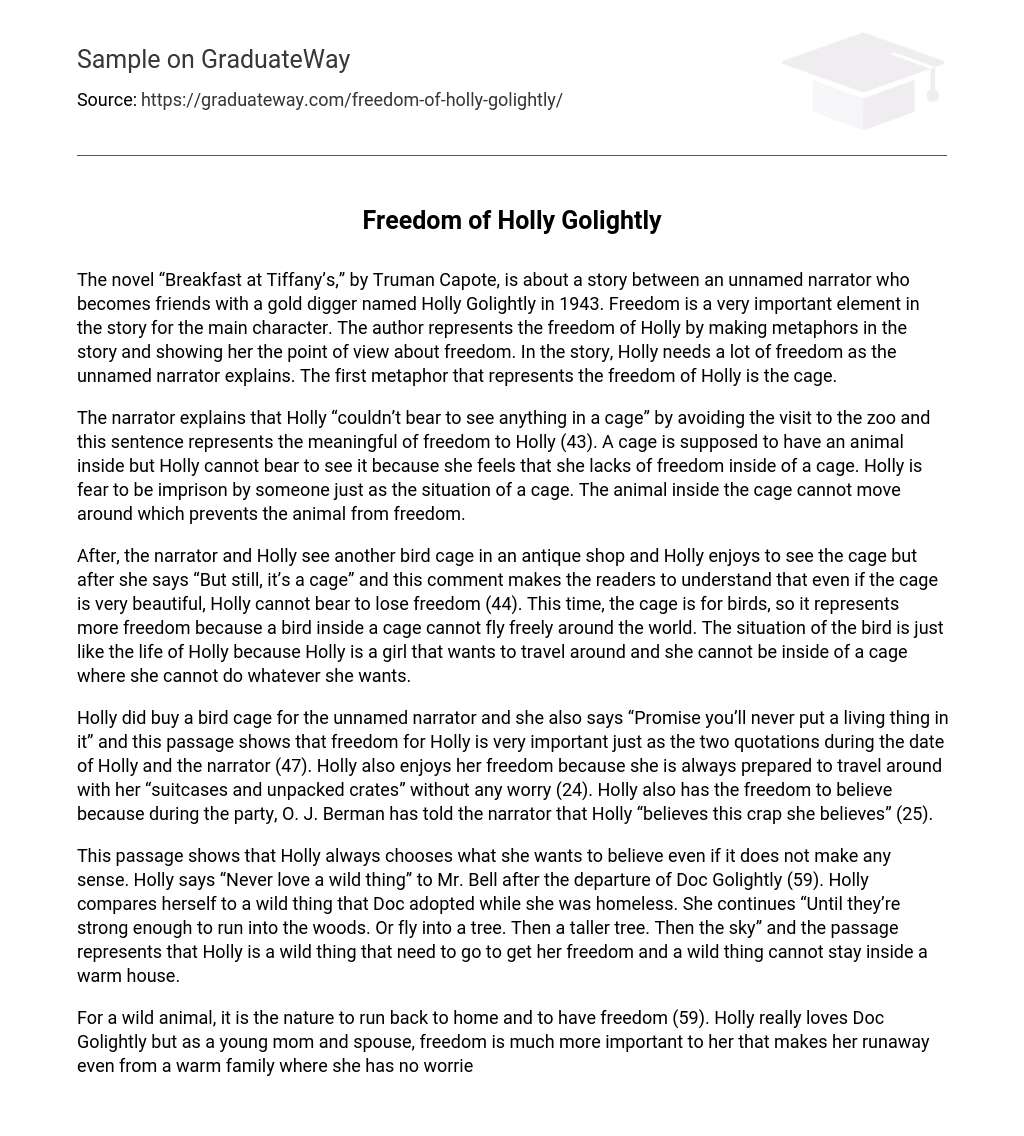The novel “Breakfast at Tiffany’s,” written by Truman Capote, revolves around an unnamed narrator who befriends a gold digger named Holly Golightly in 1943. Freedom holds significant importance for the main character, and the author effectively conveys Holly’s perspective on freedom through the use of metaphors. The story emphasizes Holly’s need for a great deal of freedom, as explained by the unnamed narrator. One such metaphor, the cage, symbolizes Holly’s longing for freedom.
The author depicts Holly’s strong dislike for visiting the zoo due to her inability to tolerate seeing anything in captivity. This signifies how crucial freedom is to Holly (43). A cage traditionally restricts an animal, but Holly finds it unbearable to witness such confinement because she associates it with a limitation on her own freedom. Similar to being locked inside a cage, Holly dreads being confined by someone else. The creature trapped within a cage cannot freely move around and consequently loses its liberty.
In an antique shop, the narrator and Holly encounter a bird cage. Although Holly is pleased by its appearance, she promptly states, “But still, it’s a cage.” This remark highlights Holly’s refusal to compromise her freedom (44). The bird inside the cage represents the restriction of liberty, as a confined bird cannot freely discover the world. This mirrors Holly’s longing for exploration and wandering since she cannot tolerate being confined in a cage that limits her independence.
Holly purchased a bird cage for the unnamed narrator and emphasized the importance of never imprisoning a living creature within it. This highlights Holly’s strong dedication to freedom, as demonstrated by two quotes from her during her date with the narrator (47). Additionally, Holly values her freedom to travel at any time with her luggage and belongings that remain unpacked and ready (24). Another aspect of Holly’s freedom is her ability to believe in her own convictions, as mentioned by O. J. Berman at a party where he comments on Holly’s firm belief system (25).
The text highlights Holly’s tendency to believe what she wants, regardless of logic. After Doc Golightly’s departure (59), Holly tells Mr. Bell “Never love a wild thing.” She compares herself to a homeless wild thing that Doc adopted. She further explains how a wild thing needs to gain strength to venture into the woods or fly into higher trees, eventually reaching the sky. This passage illustrates Holly’s desire for freedom and her belief that a wild thing cannot be confined to a cozy home.
It is natural for a wild animal to return home and seek freedom (59). Holly has a deep love for Doc Golightly but as a young mother and wife, freedom holds greater importance for her. She even runs away from a loving family where she lacks any concerns. Holly demonstrates that freedom outweighs a stable life with her husband. Finally, after being arrested, she attains a small taste of freedom.
She states, “I haven’t much choice,” emphasizing Holly’s constant search for freedom, which ultimately leaves her with limited options (81). In conclusion, the theme of freedom plays a significant role in Holly’s life. Symbolically, the bird cage represents her longing for freedom. The author conveys that freedom holds great importance for women during that time period. Sometimes, freedom outweighs the significance of family and a secure lifestyle.
Work Cited
Capote, Truman. Breakfast at Tiffany’s. New York: Vintage Books, 2012. Print.





